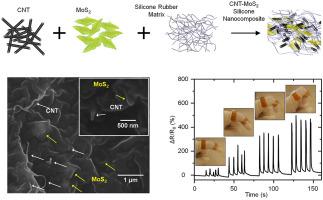Composites Part B: Engineering ( IF 12.7 ) Pub Date : 2023-04-17 , DOI: 10.1016/j.compositesb.2023.110759 Md Najib Alam , Vineet Kumar , Dong-Joo Lee , Jungwook Choi

|
Stretchable rubber nanocomposites have been investigated for detection in piezoresistive strain sensors. Tensile toughness must be improved while maintaining stretchability to realize high-performance, robust, stretchable nanocomposites. We investigate a stretchable and synergistically toughened silicone nanocomposite-based, piezoresistive strain sensor using multiwalled carbon nanotubes (MWCNTs) and molybdenum disulfide (MoS2). One-dimensional MWCNTs mechanically reinforce the silicone rubber matrix, improving tensile strength by 95% but decreasing fracture strain by 27% at 5 phr, providing an electrical percolation network. Adding two-dimensional nanolayers of MoS2 as a single filler increases fracture strain from 205% (unfilled) to 320% (5 phr MoS2), possibly due to cure retardation in the silicone rubber, preventing over-curing. Silicone nanocomposites exhibit improved tensile toughness at 8.46 kJ/m3 for 5-phr MWCNT-MoS2 hybrids due to the synergistic effects of the hybrid filler, a 125% improvement over unfilled rubber. Nanocomposites maintain a low elastic modulus (<0.45 MPa) suitable for stretchable sensors. The nanocomposite utility is demonstrated as body-attachable, piezoresistive strain sensing with a gauge factor of ∼25.95 (100%<Δε<155%), stretchability of up to 155%, and durability of over 5000 cycles. Toughened nanocomposites with MWCNT and MoS2 hybrid fillers could be useful for applications requiring robust stretchability and sensitivity.
中文翻译:

使用碳纳米管和二硫化钼的协同增韧硅橡胶纳米复合材料用于可拉伸应变传感器
可拉伸橡胶纳米复合材料已被研究用于压阻式应变传感器的检测。必须提高拉伸韧性,同时保持可拉伸性,以实现高性能、坚固、可拉伸的纳米复合材料。我们使用多壁碳纳米管 (MWCNT) 和二硫化钼 (MoS 2 ) 研究了一种基于可拉伸和协同增韧的硅纳米复合材料的压阻式应变传感器。一维多壁碳纳米管以机械方式增强硅橡胶基体,在 5 份时将拉伸强度提高 95%,但断裂应变降低27%,从而提供电渗透网络。添加二维的MoS 2纳米层作为单一填料,断裂应变从 205%(未填充)增加到 320%(5 phr MoS 2 ),这可能是由于硅橡胶的固化延迟,防止过度固化。由于杂化填料的协同作用, 5 份 MWCNT-MoS 2杂化物的有机硅纳米复合材料表现出 8.46 kJ/m 3的改进拉伸韧性,比未填充橡胶提高 125%。纳米复合材料保持低弹性模量 (<0.45 MPa),适用于可拉伸传感器。纳米复合材料的实用性被证明是可附着在身体上的压阻式应变传感,其应变系数约为 25.95(100%<Δε<155%),可拉伸性高达 155%,耐久性超过 5000 次循环。具有 MWCNT 和 MoS 2的增韧纳米复合材料混合填料可用于需要强大拉伸性和敏感性的应用。















































 京公网安备 11010802027423号
京公网安备 11010802027423号